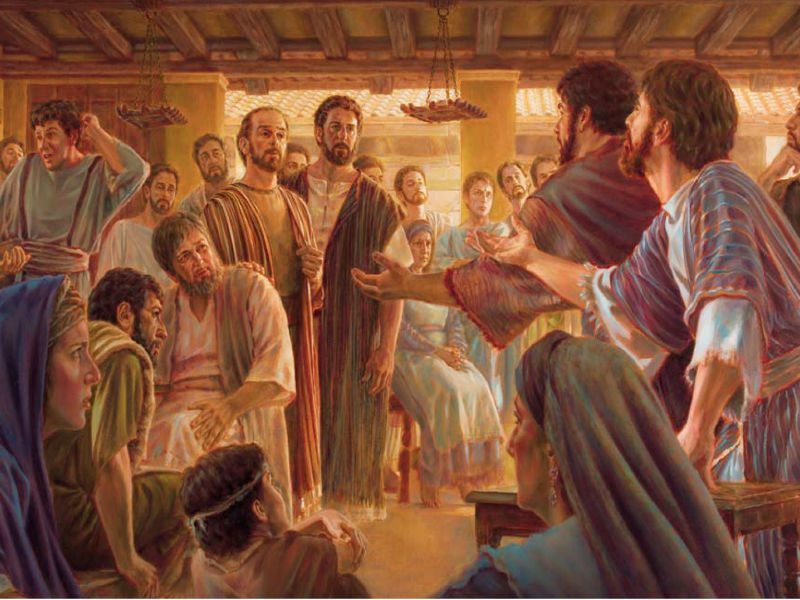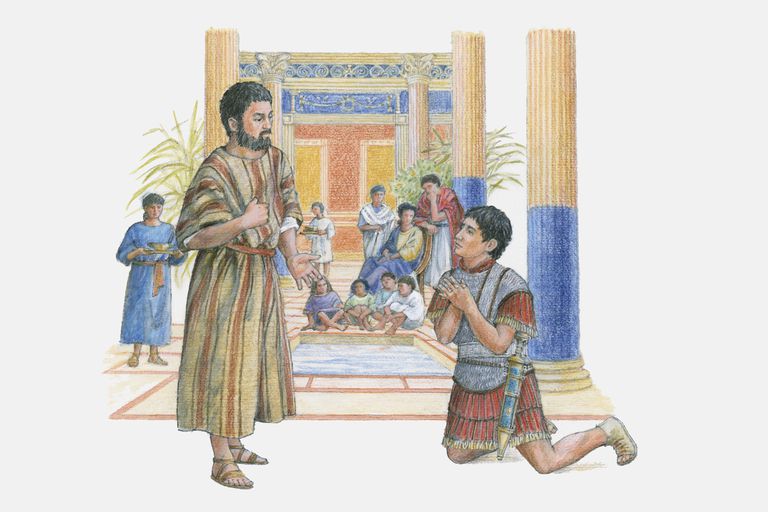1 Thess - Chapter 1
The Apostle Paul gives his greeting and explains how happy he is in the growth of this new church. Even in affliction, these believers grew in their faith with joy. This shows us today how we too can grow in our faith with joy in the midst of any affliction.
1 Thessalonians - Chapter 1

Understanding the Apostle Paul
Part of understanding the Apostle Paul's ministry is knowing the culture of the 1st century people with whom the apostle ministered, as well as the ways of the author - in this case being the Apostle Paul.
In the last lesson on the Background of the Book of 1 Thessalonians, we learned a little about the culture of the times and the people of Thessalonica. As we study the writings of the Apostle Paul, it becomes apparent that he was a man of strong discipline. He was set in his ways, even though his words came straight from the throneroom of God. The way he writes, his salutations, his consistent customs, the wordings he used to the various groups of people are all methodically thought out beforehand. He doesn't vary his tactics from city to city in what he did and what he said (Acts 17:2). With the exception of the Book of Hebrews, which many say the Apostle Paul was the author, which we do not know for certain, all of Paul's introductions are pretty much the same, and how he ministered to the people was very much planned out, but consistent in every city.
Greetings

1 Paul, Silvanus, and Timothy, To the church of the Thessalonians in God the Father and the Lord Jesus Christ: Grace to you and peace from God our Father and the Lord Jesus Christ.
Paul, as the author of this book, was assisted by Silvanus (Silas) and his young disciple Timothy who were with him in Corinth to write this letter to the Church at Thessalonica. Both Silas and Timothy were with the apostle in Thessalonica as they presented the Gospel in the synagogue and in the marketplace several months earlier where a few Jews, and many Gentiles came to believe in Christ.

Because their ministry only lasted three weeks, due to unbelieving Jews attempting to get them arrested, Paul, Silas and Timothy quickly fled the city. They went to Berea where their stay was a little longer. Paul again was forced to flee that town and headed down to Athens, but left Silas and Timothy there to minister to the new believers. When Paul arrived in Athens, he sent for Silas and Timothy to join him. While he waited for them, he saw that the city was heavily influenced by pagan idols everywhere. That gave him much opportunity to minister to those around him in Athens. When the team joined up together again, Silas and Timothy joined Paul in ministering to the people of Athens. Shortly thereafter, however, Paul sent Timothy back to Thessalonica while Silas and a few disciples the Apostle Paul had gathered together joined him to go on to Corinth.
Timothy was given charge to check on the conditions of the church in Thessalonica and encourage these new believers,making sure the church was established with a pastor, elders, church leaders and a congregation was not only growing in their faith, but they were witnessing the Gospel to others, bringing more people into the church. How long was he there is unknown. During his stay, he more than likely got to know the members of that church in a way the Apostle Paul and Silas could not because he was able to spend more time with them. When Timothy left Thessalonica to rejoin the Apostle Paul, he brought word back on the current situations that were going on in the Thessalonian church, which prompted the writing of this letter.
Salutation and Prayer

As the Apostle Paul addressed this letter to the Church at Thessalonians, he addressed it to the leaders of the church so they could read it to the congregation of believers in their church.
The apostle first gave his salutation, which would become his usual customary greeting in his future letters to other churches: Grace, which is God's favor and kindness, along with His peace be given to them.
2 We give thanks to God always for you all, making mention of you in our prayers, 3 remembering without ceasing your work of faith, labor of love, and patience of hope in our Lord Jesus Christ in the sight of our God and Father, 4 knowing, beloved brethren, your election by God.
This letter then would become an official word of the Lord to the Church to be shared with other churches as well.
Because of learning the Thessalonian believers were growing in their faith despite the persecution they were enduring, his heart was filled with gratitude. As such, he began this letter by giving thanks to God for them. They were a healthy growing church. The apostle knew that those who chose Christ - those who came into the church were there by God's design. While each one had to chose God for himself, God foreknew and had a plan and purpose for the church and each one who was a part of that body of believers. Remembering that the Apostle Paul and his team were in Thessalonica for only three weeks, being run out of town (Acts 17:1-10), Paul was grateful for Timothy's return in his efforts to assist the church in their needs. God was certainly moving within that church as their faith was growing and they remained strong in their faith. God's plans and purposes were certainly in operation within that church.
The apostle continued his letter by saying he made mention of them in his prayers, meaning he prayed continuously for them, lifting them up to the Father, trustng that God was taking care of them. Because he would later say the same thing to the churches at Rome, Ephesus, and Colossae, we see that the apostle was a man of prayer as he regularly lifted up the churches he started in the various cities.
5 For our gospel did not come to you in word only, but also in power, and in the Holy Spirit and in much assurance, as you know what kind of men we were among you for your sake.
The apostle was quick to remind the Church at Thessalonica that the words he preached as he presented the Gospel of Christ to them were more than simple words. Those words were filled with the power of the Holy Spirit drawing them to the Lord and God's operation in their lives. As such, these new believers responded by not only accepting Jesus as their Messiah, but also became followers of Him, growing in their faith.
The apostle continued his letter by saying he made mention of them in his prayers, meaning he prayed continuously for them, lifting them up to the Father, trusting that God was taking care of them. Because he would later say the same thing to the churches at Rome, Ephesus, and Colossae, we see that the apostle was a man of prayer as he regularly lifted up the churches he started in the various cities.
Followers With Much Affliction
6 And you became followers of us and of the Lord, having received the word in much affliction, with joy of the Holy Spirit, 7 so that you became examples to all in Macedonia and Achaia who believe. 8 For from you the word of the Lord has sounded forth, not only in Macedonia and Achaia, but also in every place. Your faith toward God has gone out, so that we do not need to say anything.

Even though these new followers of Christ faced suffering and affliction, they faced it with joy in the Holy Spirit. Their joy wasn't without persecution however.
Jewish

If they were Jewish, they faced family, friends, and synagogue members who were strongly opposed to their acceptance and following Jesus Christ as their Messiah. These Jewish believers, however, continued to attend their synagogue on the Sabbath because accepting Jesus as their Messiah wouldn't stop them from attending synagogue, but enhanced their faith as a Jew as they followed their long-awaited Messiah. Their unbelieving Jewish friends from the synagogue despised their affiliation with Gentile believers and their attending a church. These Jewish believers, however, continued to rejoice as they grew as a fulfilled Jew. Even though they were mocked and ridiculed, they continued to grow in their faith.
Gentiles

The Gentile believers faced affliction in another way. They left their pagan idols, along with emperor worship. That in itself carried persecution by family and friends and even ostricism. Some were even forced out of their family some losing their jobs, which of brought on poverty and unable to supply for their own needs. They no longer got drunk, went to parties, or was was involved in sexual immorality. Most of them lost their circle of friends and some even lost family members. That is why it became so critical for the new believers to meet daily (Acts 2:42). They encouraged and supported one another while they re-echoed the words they learned from the apostle, Silas, and Timothy. They prayed and had communion together so they could grow and stay strong in their faith. They even shared with other believers who had a specific need. They needed each other. Without that close connection, their faith would grow dim and eventually fade away. Instead, many met daily or very frequently so they could grow together to become strong in the Lord. In addition, they witnessed the Gospel to those around them and beyond, which led people throughout Macedonia and Achaia to know of them. They were godly examples everywhere they went.
9 For they themselves declare concerning us what manner of entry we had to you, and how you turned to God from idols to serve the living and true God, 10 and to wait for His Son from heaven, whom He raised from the dead, even Jesus who delivers us from the wrath to come.
In a large cosmopolitan trading city such as Thessalonica, the news of a Jew and Gentile assembly of believers in Jesus Christ would have the attention of the city as well as those who came to trade or simply traveling through. How these believers lived their lives rang out loud and clear. All eyes were upon them and they were the talk of the town. When believers from other towns or cities came through, these Thessalonian believers welcomed them with open arms. People could see how they left their idols to serve the living and true God. Because persecution was present in all of their lives, they even spoke of the time when Christ would come to deliver them from the wrath that was coming upon the earth. In other words, they spoke openly of the Rapture of the Church to the other believers they encountered. Jesus would come to deliver them from the terror that was coming upon the earth.
While these believers were growing in their faith, they were still a young church full of immature believers who simply wanted to serve the Lord. This letter from the Apostle Paul would be essential to help them to mature in their faith.






